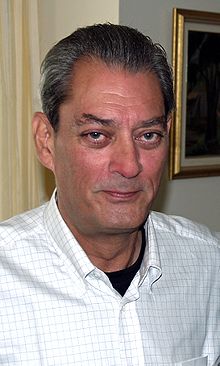Paul Auster
Appearance

Paul Auster (February 3, 1947 – April 30, 2024) was an American novelist, poet, screenwriter, essayist and editor. He is best known for novels such as The New York Trilogy, Leviathan, Mr. Vertigo, and The Book of Illusions. Some of the themes explored by Auster include: coincidence, failure, absence of father, as well as American space and history.
The New York Trilogy (1987)
[edit]- The story is not in the words; it's in the struggle.
- "The Locked Room", p. 294
The Book of Illusions (2002)
[edit]- Men don't begin to live fully until their backs are against the wall.
- That's what makes his story so impossible, David. Because he's told me the truth. (Alma to David on Hector)
- If a tree falls in the forest and no one hears it fall, does it make a sound or not? Hector had read alot of books by then, he knew all the tricks and arguments of the philosophers. If someone makes a movie and no one sees it, does the movie exist or not?
- I didn't say I was afraid of dying, I answered, I said that I was afraid to get on a plane. There is a difference. (David to Dr. Singh)
Oracle Night (2003)
[edit]- Every time my nose gushed blood, I felt like a little boy who'd wet his pants. I jumped out of the chair, pressed a handkerchief against my face, and hustled toward the nearest bathroom [...] How red the blood looked against the whiteness of the porcelain sink, I thought. How vividly imagined that color was, how aesthetically shocking. The other fluids that came out of us were dull in comparison, the palest of squirts. Whitish spittle, milky semen, yellow pee, green-brown mucus. We excreted autumn and winter colors, but running invisibly through our veins, the very stuff that kept us alive, was the crimson of a mad artist—a red as brilliant as fresh paint.
- Oracle Night, New York: Henry Holt and Company, pp. 41-42.
- April 1945. My unit was in Germany, and we were the ones who liberated Dachau. Thirty thousands breathing skeletons. You've seen the pictures, but the pictures don't tell you what it was like. You have to go there and smell it for yourself; you have to be there and touch it with your own hands. Human beings did it to human beings, and they did it with a clear conscience. That was the end of mankind [...] I'm sure you've read the stories about how some of them couldn't stop eating. The starved ones. They'd thought about food for so long, they couldn't help it. They ate until their stomachs burst, and they died. Hundreds of them.
- Oracle Night, New York: Henry Holt and Company, p. 92.
- [G]overnments always need enemies, even when they're not at war. If you don't have a real enemy, you make one up and spread the word. It scares the population, and when the people are scared, they tend not to step out of line.
- Oracle Night, New York: Henry Holt and Company, p. 168.
Man in the Dark (2008)
[edit]- For only the good doubt their own goodness, which is what makes them good in the first place. The bad know they are good, but the good know nothing. They spend their lives forgiving others, but they can't forgive themselves.
- Man In The Dark, New York: Henry Holt and Company, p. 63.
External links
[edit]Categories:
- 1947 births
- 2024 deaths
- Academics from the United States
- Novelists from the United States
- Poets from the United States
- Essayists from the United States
- Translators from the United States
- Screenwriters from the United States
- Film directors from the United States
- Jews from the United States
- People from Newark
- Editors from the United States
- Postmodern authors
- Independent Spirit Award winners

